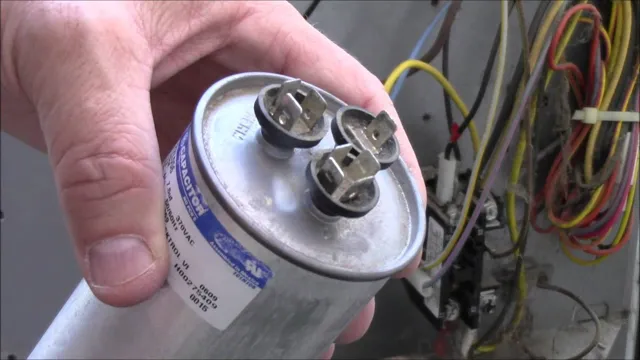If you’ve ever walked into your home to find that your AC isn’t working, chances are you’ve experienced the frustration of trying to troubleshoot the issue on your own. One of the most common culprits of an air conditioning system malfunction is the compressor. When your AC compressor goes out, the cool air stops flowing, leaving you with a hot and uncomfortable home.
But don’t worry, with a few simple steps, you can troubleshoot your home AC compressor and get your cool air flowing again. In this blog post, we’ll discuss what exactly an AC compressor is, how to identify common problems with your compressor, and some steps you can take to troubleshoot and repair the issue. So grab a cold drink and let’s get started!
No Power to the Unit
If your home AC compressor is not working, there’s a chance that it’s not receiving any power. That’s one of the most common reasons for a malfunctioning AC compressor. So, let’s begin by checking if the unit is receiving power correctly.
If you find that there is no power to the unit, it could be due to a tripped circuit breaker or a blown fuse. You should also examine the electrical connection to ensure that everything is connected correctly. In addition, you might want to check your thermostat settings to double-check that it’s set to your desired temperature and that it’s turned on.
If none of these steps fix the issue, it’s best to seek professional assistance and get the problem repaired as soon as possible, so you don’t end up sweating your way through summer. Don’t hesitate to call a licensed technician who can inspect it safely and efficiently to get your AC running again in no time.
Check the Circuit Breaker
If you’ve noticed that your unit isn’t powering on, the first thing you should check is the circuit breaker. Sometimes, power surges can cause the circuit breaker to flip, which will cut off power to your unit. Locate your circuit breaker box and see if any of the switches have been tripped.
If so, flip the switch back on and see if the unit turns on again. If the circuit breaker keeps tripping, that can be a sign of a more serious electrical issue that needs to be addressed by a professional. Don’t ignore a tripping circuit breaker, as it could lead to a fire hazard.
By checking the circuit breaker first, you can rule out a simple fix before calling in the professionals.

Check the Thermostat Batteries
If your HVAC system suddenly stops working, the first thing you should check is your thermostat batteries. Many homeowners often overlook this simple solution, and instead, call a technician to check their HVAC system. However, if the thermostat batteries are dead, your HVAC unit will not receive any commands, and it won’t turn on.
Changing the batteries is a quick and easy fix that can save you time, money, and frustration. It’s also important to note that thermostat batteries should be replaced regularly, ideally once a year, to ensure that it continues to function correctly. So, the next time your HVAC unit refuses to turn on, check the thermostat batteries before calling a professional.
It’s a simple fix that could save you a headache.
Compressor Fails to Start
If your home AC compressor is not working, it could be a sign of a much bigger issue. Without the compressor, cold air cannot be circulated throughout your home, leaving you with a hot and uncomfortable living space. One reason your compressor may not be starting is due to a faulty capacitor.
The capacitor is responsible for sending electrical impulses to the compressor motor, allowing it to start. If the capacitor is defective, the compressor will not receive the electrical signal it needs to start running. Another issue could be a failed start relay.
If the start relay is damaged, it won’t be able to send the electrical signal to the compressor motor, making it impossible for the compressor to start. If you suspect your compressor is not working, it’s vital to contact an HVAC professional to diagnose and repair the issue promptly. Ignoring the problem could lead to more extensive and costly repairs down the road.
Check the Capacitor
If your air conditioning compressor is failing to start, it could be because of a faulty capacitor. The capacitor is a small cylindrical device located inside your AC unit that stores electrical energy and helps start the compressor. Over time, capacitors can wear out and fail, causing your compressor to struggle to start or not start at all.
Fortunately, replacing a faulty capacitor is a straightforward and relatively inexpensive fix that can save you from having to replace your entire AC unit. Be sure to hire a professional technician to diagnose the issue and replace the capacitor if necessary. With a new capacitor, your compressor should start up smoothly and efficiently, keeping your home cool and comfortable.
Check for Refrigerant Leaks
If your AC compressor fails to start, there may be a few reasons why. One of the most common causes is a refrigerant leak. Refrigerant is necessary for the AC system to function properly, and a leak can cause the compressor to fail.
Often, leaks are caused by small punctures or cracks in the refrigerant lines. To check for leaks, a professional technician can perform a leak test using specialized equipment. If a leak is detected, the technician will need to repair the damaged area and recharge the refrigerant.
Ignoring a refrigerant leak can cause your AC system to fail completely, so it’s important to address the issue as soon as possible.
Inspect and Clean Coils
If your compressor fails to start, it may be due to dirty or blocked coils. Dirt and debris accumulation can cause your system to work harder, increasing energy consumption and even leading to system failure. To avoid these issues, it is important to regularly inspect and clean your system’s coils.
This involves removing the exterior covering of your unit, locating the coils, and gently brushing away any dirt or debris. In some cases, a professional HVAC technician may need to be called to assist with the cleaning process. Regular maintenance, including coil cleaning, can greatly extend the life of your HVAC system and help you avoid costly repairs or replacements in the future.
So, if you notice your compressor struggling to start, consider checking the condition of your coils and removing any obstructions to ensure optimal system performance.
Compressor Runs but Does Not Cool
If your home AC compressor is running but doesn’t seem to cool your house, there could be several possible causes. One issue might be a low refrigerant level in the system. Without enough refrigerant, the compressor will run continuously but won’t produce enough cool air.
You might also have a faulty electrical connection somewhere in the unit, which could prevent the compressor from functioning properly. Additionally, dirty or clogged air filters could block the proper airflow into the system, causing the machine to overheat and fail to cool off. Whatever the problem might be, it’s best to seek professional help to diagnose and repair the issue to avoid further damage to your AC unit.
Don’t wait until the problem becomes more severe and start taking steps to keep your home cool and comfortable once again. If your home AC compressor is not working correctly, make sure you contact a reliable HVAC technician for assistance.
Check for a Dirty Filter
If your AC compressor seems to be running but no cool air is coming out, the first thing to check is the filter. A dirty filter can cause the compressor to work harder, which can lead to higher energy bills and less efficient cooling. It’s important to clean or replace your air filter regularly, especially during peak heating and cooling seasons.
A clogged filter can also lead to other problems, like frozen coils or even a burnt-out compressor. Think of it like trying to breathe through a straw – it’s harder and less effective, and can cause respiratory issues over time. By keeping your air filter clean, you’ll not only save money on energy bills, but also prolong the life of your AC system.
So take a few minutes to check your filter and ensure it’s not the culprit behind your AC issues.
Leaking Refrigerant
If you hear your refrigerator compressor running, but it’s not cooling, it could be due to a refrigerant leak. When refrigerant leaks, the compressor overworks and tries to maintain a regular temperature, but it cannot function properly without the refrigerant. In fact, running the compressor without enough refrigerant can cause permanent damage to the compressor and other parts of your fridge.
A refrigerant leak can occur from various sources, including small cracks in the refrigerant lines or joints, or even a damaged compressor. Unfortunately, refrigerant leaks often go undetected since the refrigerant is colorless and odorless. If you suspect a refrigerant leak, it’s essential to contact a professional to diagnose the problem and fix it as soon as possible.
In conclusion, a leaking refrigerant can cause your compressor to run without cooling your refrigerator. Regular maintenance of your fridge can help prevent refrigerant leaks, but if you experience this issue, it’s best to leave it to the professionals to diagnose and repair the problem. Don’t forget to contact a licensed technician to avoid further damage and expenses.
When to Call a Professional.
If you find yourself in a situation where your home AC compressor is not working, it’s important to consider when to call a professional. While there are a few simple DIY steps you can try to troubleshoot the issue, such as checking your thermostat or changing your air filter, it’s best to get a licensed technician involved if the problem persists. An AC compressor is a complex piece of machinery that requires technical knowledge and expertise to fix or replace.
Attempting to repair it on your own could not only be dangerous, but it could also result in further damage to both your AC unit and your home. When you’re dealing with a faulty AC compressor, it’s better to be safe than sorry, so don’t hesitate to call in the professionals to ensure your comfort and safety.
Conclusion
Well folks, it looks like your home ac compressor has called in sick and is refusing to work. Perhaps it’s taking a summer vacation or catching up on some much-needed R&R. But fear not, with the help of a trusted HVAC technician, your compressor should be up and running in no time.
Until then, whip out those fans and ice packs, and embrace the heat with open arms (and plenty of sunscreen, of course). Remember, sometimes even machines need a break, but we’ll have you chilling like a pro in no time!
FAQs
What are some common causes of a home AC compressor not working?
Some common causes of a home AC compressor not working include a faulty thermostat, low refrigerant levels, a dirty air filter, or a malfunctioning capacitor.
How can I troubleshoot my home AC compressor not working issue?
Begin by checking the thermostat settings, cleaning or replacing the air filter, and ensuring proper power supply to the unit. If those solutions do not work, call a professional technician for further diagnosis.
Can I fix a home AC compressor not working issue myself, or should I call a professional?
While some basic troubleshooting can be done on your own, it is best to call a professional technician to diagnose and repair issues with your home AC compressor.
How often should I have my home AC compressor serviced to prevent it from not working properly?
It is recommended to have your home AC compressor serviced at least once a year to catch any potential issues before they cause significant problems and lead to the compressor not working properly.

